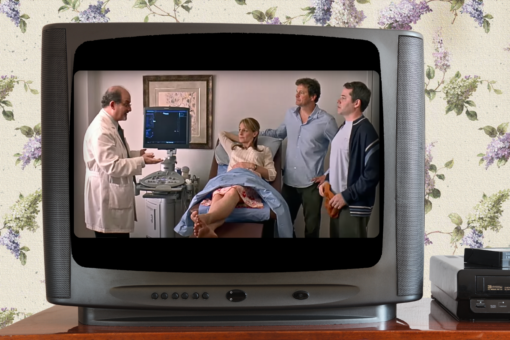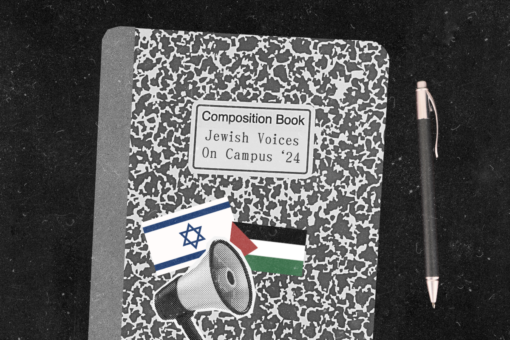When a Jew is on their deathbed, tradition has it that the last words on their lips should be the Shema, one of the most essential Jewish prayers that affirms God’s singularity. When Jewish actor and comedian Richard Belzer died this week on February 19, his last words were reportedly, “Fuck you, motherfucker.”
It’s a perfect encapsulation of what I admired about Richard Belzer: To the very end, his essence was deeply Jewish, if imperfectly so. It’s for this reason, too, that I fell in love with his most famous character, Detective John Munch.
I first encountered Munch when I started watching “Law & Order: Special Victims Unit” nearly 10 years ago. Immediately, my favorite characters on the squad were detective partners Elliot Stabler (Christopher Meloni) and Olivia Benson (Mariska Hargitay), because how could they not be? As the centerpieces of a show I loved for its heroic sense of right and wrong, Benson’s feminist strength mixed with Stabler’s aggressiveness and immovable sense of justice (and their will they-won’t they relationship) made them irresistible to watch.
At the same time, I couldn’t help but grow a soft spot and deep affinity for Munch.
While being a somewhat secondary character on the show, Munch was a backbone of the Special Victims Unit. As a longtime cop, Munch held institutional knowledge that he shared with the squad when he wasn’t spouting conspiracy theories and wise cracking with his wry sense of humor. (Before “SVU,” the character of John Munch originated as a detective from Baltimore in the show “Homicide: Life on the Streets,” which also happened to have a few crossover episodes with “Law & Order.”) Most importantly to me, however, was that, like Belzer, Munch was Jewish, and his Jewishness was an integral and authentic part of his character.
In “Care,” season three episode nine, Munch first discusses his Jewishness in the “SVU” universe. (Unbeknownst to me at the time, Munch’s Jewish identity was featured in the 1997 “Homicide” episode “Kaddish,” in which Munch investigates the murder of a Jewish woman he knew from his childhood. The episode ends with Munch donning a kippah and reciting Kaddish.) While looking for evidence at a crime scene, he tells his partner, Detective Fin Tutuola (Ice T), “It takes me back to the Easter egg hunts of my youth.” To which Fin questions, “You’re Jewish, your parents hid eggs?”
“My point exactly, all those hours of futile searching,” Munch retorts.
Munch’s Jewish identity comes up in more serious contexts as well. In season nine episode 13, “Unorthdox,” when David, a young Jewish boy, is assaulted, Munch is an indispensable bridge between the secular cops and the Hasidic community that David’s father belongs to. He gains the trust of David’s father Avi with a back and forth of Jewish concepts, telling Avi that he shouldn’t shield a possible suspect because of lifnei iver, the biblical idea that he’s commanded not to mislead others. (Later, we see this trust dissolve when another member of the Hasidic community tries to lie to the police and Munch figures it out because he understands Yiddish.) On the other side of things, Munch explains to his colleagues what Hasidic Judaism is and the insularity of their community, giving them a better understanding of the denomination.
“SVU” also shows Munch experiencing violent antisemitism, like in “Raw,” the sixth episode of season seven. After a shooting on a school playground, the squad comes face-to-face with a group of neo-Nazis known as RAW, Revolution Aryan Warriors. Through his encounter with RAW, Munch is called the k-slur, witnesses members of the group spew antisemitic propaganda and is eventually shot (though, thankfully, his injuries are not life-threatening). Throughout, Munch deals with the hatred with remarkable grace and with the support of his colleagues. When a brainwashed neo-Nazi child tells Munch that Jews are “the descendants of the union between Eve and Satan,” Fin defends Munch, returning, “And who do you think spawned you?”
In total, the picture the viewer gets of Munch, until he retires in season 15, is one of a man whose Jewish identity is thoughtfully crafted and was perhaps even inspired by Richard Belzer’s own life. Munch shares other similarities with Belzer, like the fact that both are conspiracy theorists interested in UFOs and the JFK assassination, both of their father’s tragically died by suicide, and both have been divorced multiple times. It seems only reasonable that Munch’s Jewishness felt authentic because they were Belzer’s expressions of his own Jewishness.
For context, Belzer was born on August 4, 1944 in Bridgeport, Connecticut to an Ashkenazi Jewish family. Like many Jewish comics before him, his sense of humor was brought on by a difficult childhood. His mother Frances was abusive and Richard later said, “My kitchen was the toughest room I ever worked. I had to make my mom laugh or I’d get my ass kicked.” In 1987, Belzer told Terry Gross that he also somewhat resented his parents and family for speaking Yiddish, but not teaching him or his brother the language. (Instead, he later got into Yiddish music to try to establish a connection to the language.) By the time he was 25 years old, she had died of cancer and his father Charles died by suicide. (Unfortunately, his brother Leonard would later die by suicide in 2014.) After graduating from high school, Belzer served in the army for a year before being discharged and worked as a reporter for The Bridgeport Post, before trying stand-up comedy in the 1970s. Though he rarely spoke about his Jewish identity, Judaism was sometimes a topic of his stand-up, with one of his most notable bits is a joke about Bob Dylan’s bar mitzvah.
His first break finally came in 1975 when he started working as the warm-up comic for “Saturday Night Live.” His next would be in 1993 when he was cast as Detective Munch in “Homicide: Life on the Streets.”
As I’ve gotten older, my love of Detective John Munch has evolved to consider his imperfections. Over the last 10 years, I’ve come to view shows like “Law & Order” as copaganda, a form of propaganda which depict police officers in a positive way while overlooking any negative qualities or actions. As someone whose commitment to social justice is driven by Jewish values like tikkun olam, it’s been hard to square the fondness I feel for fake police officers like Munch with the real life violence and harm police officers in the United States have committed against Black people and communities of color as a whole.
What’s more, when the “SVU” cops do commit harm in the show, it’s often excused and rationalized as being in the pursuit of justice. For example, the vitriol that police officers express towards any suspects is extremely problematic. For a squad whose entire goal is preventing sex crimes, the amount of times that the officers of the Special Victims Unit graphically tell suspects about sex crimes they wish upon them is unnerving — and Munch is no exception.
Additionally, at the same time that Munch’s Jewish representation is fully fleshed, it has sometimes come at the expense of other Jewish characters. In the aforementioned episode “Unorthodox,” the Hasidic community is depicted as being close-minded and cultish (with one character specifically comparing Hasidism to a cult), and that’s not to mention all the terrible fake beards and payot that some of the actors wear as costumes. And in spite of it all, the actual perpetrator of the crime wasn’t a member of the Hasidic community anyway, meaning the cops, including Munch, disrupted a Hasidic Jewish community for nothing.
With these flaws in mind, I’ve wondered over the years, and more recently in light of Richard Belzer’s death, if it’s possible to still love John Munch. For me, I think the answer is yes, but not in the way I did as a teenager. Now I understand that John Munch isn’t some heroic figure. Rather, he’s an imperfect Jewish man, whose authentic Jewishness I can love at the same time that I weigh the consequences of his flawed behavior. I think, after all, that is the most Jewish way to enjoy a TV character.
So, fuck Richard Belzer and Detective John Munch. May their memories be a motherfucking blessing.



